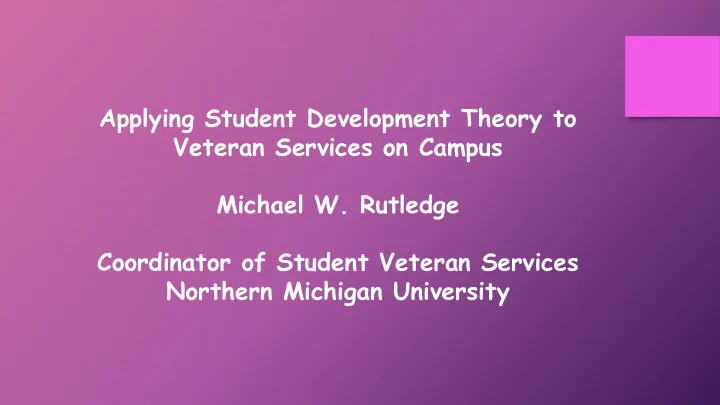

Applying Student Development Theory to Veteran Services on Campus Michael W. Rutledge Coordinator of Student Veteran Services Northern Michigan University
Agenda: • Describe the two theories to be focused upon 1. Transition Theory 2. Attribution Theory • Explain their application to various student veteran populations • Briefly discuss other student development theories which can be useful • Work through three case studies from actual NMU/VRR participating schools’ student veterans
TRANSITION THEORY
Transition theory was developed by Nancy Schlossberg in her 1984 text: Counseling Adults in Transition: Linking Practice with Theory . It was revised in 1989 and again in 1995. The theory focuses on adult development, particularly concerned with the “process” of transitioning from one role to another, one relationship to another, and other aspects of life. The theory is particularly valuable when working with veterans transitioning from the regimented lifestyle of military service to the more independent, unstructured life of a college student.
Model and Application The primary model which would be most effective in working with student Veterans is the 4’s:
ATTRIBUTION THEORY
Attribution theory was developed by Fritz Heider in 1958 and uses three Models: 1) the Correspondent Inference Theory Model; 2) the Covariation Model (developed by Harold Kelley); and 3) the Model of Achievement Attributions (developed by Bernard Weiner). The theory analyzes how the average person constructs the meaning of an event based on their motives to find a cause and their knowledge of the environment. For the purposes of this presentation (and working with transitioning veterans), Weiner’s Model is well suited.
Other Useful Theories: Time limits allow only for a listing of some other student development theories which can Be useful to a student veteran services administrator (most of these theories include many application models as well): Critical Race Theory • Sexual Identity and Gender and Gender Identity theories (useful as more and more • veterans will be identifying as other than heterosexual normative moving forward) Social and Class Identity theories • Disability Identity Theory • Obviously this is only a small sampling; veterans are as diverse as any other population And effectively working with them requires at least a general knowledge of student development theories.
Case Studies Discuss how to apply Transition and Attribution Theories (feel free to consider the others theories mentioned or others you are knowledgeable of as well) to the following situations:
1. An older veteran has recently retired from the Navy and is beginning school as a freshman; he expresses a great deal of anxiety when you initially meet him about being around much younger students as well as being concerned about “conflicting political opinions with professors.” After the first month of school the veteran is also discovering he dislikes group assignments as he feels he ends up doing all the work because the younger students are “lazy kids.”
2. A recently separated female veteran speaks with you about applying for the GI Bill but mentions she has heard of the vocational rehabilitation program. She is very reluctant to even tell you her VA rating to determine eligibility.
3. A married couple, one a recently separated Marine and the other still on active duty (home on leave) stop in your office. They want to discuss the former obtaining his GI Bill benefits, establishing a home for their two children, and preparing for the latter’s (wife) separation in about 18 months. This couple is about as Marine as Marine can be — they have everything prepared and applied for, housing and schools have been researched, and a career/life plan prepared from freshman years to retirement; YOU have some anxiety about possible transition issues into a relatively unregimented culture.
Conclusion Whether or not you were aware of SDTs, you have probably realized you employ them intuitively; thoughtful application of them can assist your student- veterans’ movement toward academic success. Feel free to contact me at: mrutledg@nmu.edu; I may not have all the answers, but I can certainly help in the finding of them!
Recommend
More recommend